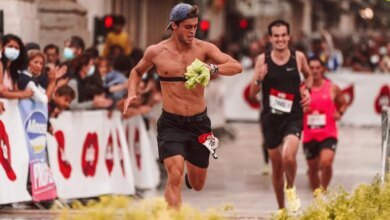Allergy-Friendly Muscle Building: Build Muscle Without Dairy

My stomach decided it hated dairy about two years into my lifting journey. And not gradually either. One week, I was drinking a whey protein shake twice a day like every other guy in the gym, and the next I was experiencing cramps that made me question every decision I’d ever made. The worst part? It happened before a beach vacation where I had been training all winter. Nothing says summer body like spending half your trip in the bathroom.
My doctor ran some tests and confirmed what my gut already knew. Lactose intolerance has entered the chat, and there’s nothing subtle about it. I remember sitting in her office feeling so devastated, as if she had just told me I would never be able to lift weights again. Looking back, that reaction was ridiculous, but in that moment I felt like my entire physical identity was collapsing.
I really panicked. How was I supposed to build muscle without a protein shake? It seems like every fitness influencer I follow lives on whey protein and Greek yogurt. My post-workout routine was the same chocolate protein for two years in a row. The thought of eating six chicken breasts a day to meet my protein goals made me want to stop training altogether.
It turns out I wasn’t alone in this struggle, and there are actually entire rules for building muscle when dairy isn’t available at all. I found out the hard way over the next year so you wouldn’t have to.
Understanding the dairy dilemma
Here’s what makes dairy such a common problem for people trying to get stronger. Lactose intolerance affects more people than most fitness content acknowledges. Some studies suggest that up to 65% of the world’s population has some degree of reduced lactose digestion after childhood. That’s a lot of people trying to follow mainstream fitness advice that assumes everyone can handle dairy.
Then there’s the actual dairy allergy, which is different from intolerance and can be more serious. My training partner gets hives if he touches cheese. Watching him accidentally eat something with hidden dairy in a restaurant taught me how carefully some people have to navigate food.
The frustrating part is that the fitness industry has made dairy products seem necessary for muscle growth. Visit any supplement store and you’ll find that 80% of protein powders are whey or casein. Fitness meal prep videos are uploaded with cheese, Greek yogurt and milk. It’s as if the entire industry forgot that humans built muscle for thousands of years before industrial dairy production became a thing.
Reconsider your protein sources
Once I stopped panicking about losing my precious whey protein, I actually started eating better. Whole food protein sources have become my staple rather than an afterthought. Chicken, turkey, beef, pork, fish, and eggs have moved to center stage in my meal planning. My grocery cart looked completely different, and honestly, my bank account felt that way too at first.
Eggs in particular have become my best friend. Six whole eggs for breakfast gave me about 36 grams of protein plus healthy fats that kept me full until lunch. I was creative with the preparation so I wouldn’t get bored. A shake on Monday with hot sauce, a hard boil for meal prep on Tuesday, and an omelet loaded with peppers and onions on Wednesday. My coworker started calling me an egg guy, which I chose to take as a compliment.
The fish entered a more circular path than before. Salmon, tuna, cod and tilapia contain serious proteins without any involvement of dairy products. I learned to cook fish properly instead of turning it rubbery, which was a game changer. It turns out that you’re not supposed to cook salmon until it’s gray and dry. Who knew? A piece of properly cooked salmon with some rice and toasted cauliflower became one of my go-to post-workout meals that I actually looked forward to eating.
Red meat got more respect in my diet too. A good steak or some ground beef provides not only protein, but also iron, zinc and B vitamins which support recovery from training. I’ve been so focused on boring chicken breasts for years that I’ve forgotten how satisfying and nutritious beef is. My father, who believes vegetables are a waste of stomach space, was thrilled when I started asking him about his burger recipes.
To get adequate protein between whole meal diets, I discovered egg white protein powder that completely solved my supplement problem. It mixes well, doesn’t upset my stomach like regular whey, and provides high-quality protein without any dairy ingredients. It will be a game changer for those quick mornings when I needed something quick before training but didn’t have time to cook actual eggs.
Modify your training approach
Losing dairy didn’t mean I had to change my actual training program, but I did need to pay more attention to recovery nutrition. Without the convenience of a post-workout whey shake, I had to plan better.
I started preparing my post-workout meals in advance. Grilled chicken with sweet potatoes. Ground turkey with rice. Fry meat and vegetables. Having real food ready to eat within an hour of training has made a huge difference in my recovery and how I feel the next day.
My training intensity remained the same. Gradual overload still works. Adding weight to the bar week after week still builds muscle. The dairy issue was a nutritional conundrum, not a training restriction. This realization helped me stop catastrophizing about the whole situation.
Rest days became more important to monitor how my body responded to the new nutrition approach. I paid attention to my energy levels, sleep quality, and how much pain I felt between sessions. Adjusting my total protein intake based on actual results rather than what some articles said I needed made everything fall into place.
A weekly meal prep system that actually works
Sunday afternoons used to be reserved for watching football and doing nothing productive at all. Now is when I set myself up for success. I put on a podcast, open a beer, and spend two hours in the kitchen cooking enough protein to last most of the week. It’s almost become therapeutic, honestly.
Here’s what my typical prep session looks like:
- Five pounds of chicken thighs on the grill because they’re cheaper and tastier than breasts
- Four baked salmon fillets with lemon and garlic that I’ll be eating over the next few days
- Eighteen hard-boiled eggs can become instant snacks or quick breakfast additions
- Three pounds of ground beef, fried and marinated, which is used in various meals
- Too much rice in the rice cooker because carbs are not the enemy
The whole process probably costs me $40 and eliminates the 6pm panic of “what am I going to eat” that was constantly derailing my nutrition. My girlfriend thought I was crazy when she first saw my refrigerator filled with identical containers. Now she’s asking me to prepare more for her too.
Breakfast during the week has become stupidly simple. Scrambled eggs with whatever vegetables I had around. Maybe some salsa if I’m feeling fancy. A piece of pre-cooked salmon with some rice if you’re really hungry. The consistency has made tracking my macros much easier than trying to figure out what I ate at a breakfast burrito.
Supplements that actually help
In addition to the egg white protein powder I mentioned, there are a few other supplements that fill in the gaps in my nutrition. Creatine Monohydrate has nothing to do with dairy and is one of the most researched supplements for enhancing strength and muscle gain. Five grams per day has made a noticeable difference in my training performance.
A good multivitamin provides insurance against any micronutrient gaps. When you eliminate an entire food category from your diet, having this essential covered gives you peace of mind.
Omega-3 fish oil supplements support joint health and recovery. My knees thanked me for this addition, especially as my lifts got heavier.
The results speak for themselves
After six months of giving up dairy, I was actually stronger and fitter than before. My squat went up 40 pounds, from 275 to 315. My bench press added 25 pounds. My body fat dropped from about 18% to 14% without even trying because my digestion improved dramatically. I wasn’t doing anything magical with my training. Same exercises, same progressive overload approach. The only difference was that my body could actually process and use the food I was eating.
The constant bloating that I had attributed to just a portion of excess volume has completely disappeared. I walked around feeling like I had a balloon in my stomach half the time. It turns out that this isn’t normal and you don’t have to accept it as the price for gaining muscle. My energy stayed steady throughout the day instead of crashing hard after meals. Gone are those afternoons when I needed three cups of coffee to stay awake.
My skin became clearer too, which was an unexpected bonus that I didn’t associate with dairy consumption at all. I’ve been dealing with random rashes on my back and shoulders for years, assuming it was just sweating at the gym. After two months of eliminating dairy, my back became clear for the first time since high school. My dermatologist had been trying to get me to think about this connection for years, but I ignored him because I didn’t want to give up protein shakes.
Most importantly, I stopped feeling limited by my dietary restrictions. They become just another variable to work on, such as selecting exercises based on available equipment or adjusting training volume based on recovery capacity. I actually felt more in control of my nutrition than I had before when I was unknowingly eating the same shake twice a day without thinking about what I was putting into my body.
What I tell my clients now
When a client tells me they can’t handle dairy or feel bloated after meals, I know exactly what they’re going through — because I lived it.
Building muscle without dairy products is 100% possible. You just need:
- Consistent protein intake from whole foods
- Smart supplements (such as egg white protein)
- Gradual overload in training
- Recovery and adequate sleep
Your muscles don’t care whether the protein comes from milk or salmon, but rather care about constantly providing your body with the right nutrients.
Move forward with confidence
Building muscle without dairy is completely doable. It takes a little more planning and preparation than relying on convenient protein shakes, but the trade-off of feeling better every day makes it worth it.
Your body doesn’t care whether your protein comes from cow’s milk or chicken breast. It just needs enough amino acids to repair and build muscle tissue. Focus on total daily protein intake from high-quality sources, train hard with progressive overload, get enough sleep, and stay consistent. Results will come regardless of whether dairy products are included or not.
My lifting journey has improved after quitting dairy, not worse. You can too.
Don’t miss more hot News like this! Click here to discover the latest in Health and Fitness news!
2025-11-13 20:40:00




